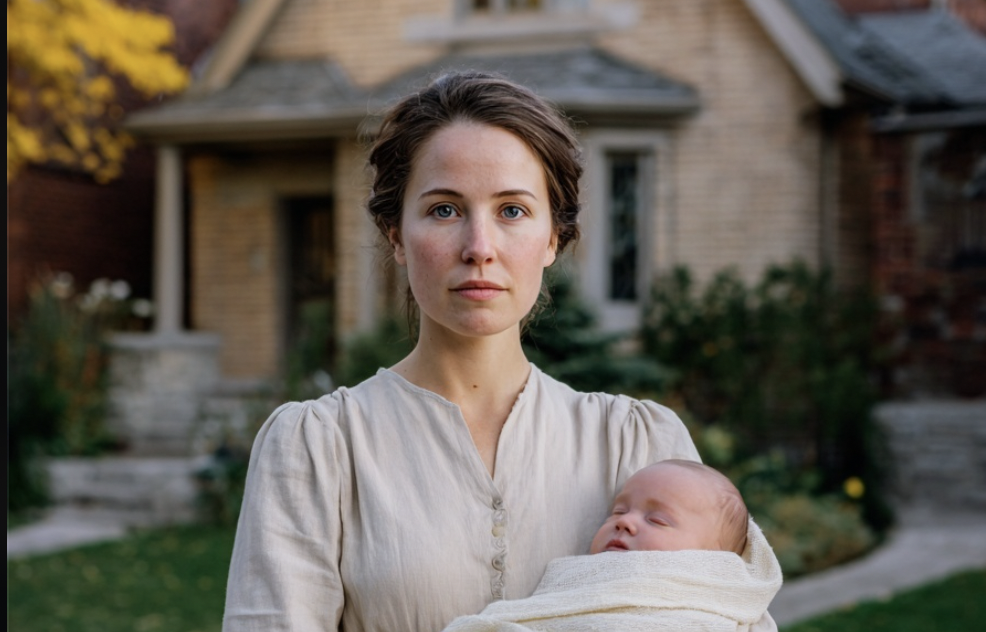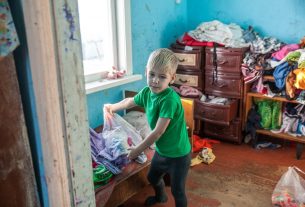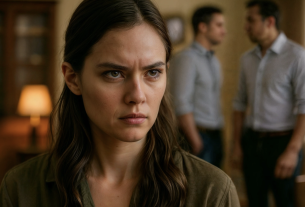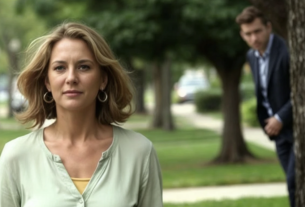“What is a child without roots?”
“No one. A shadow in search of shape,” I answered.
Mikhail stirred his coffee slowly, seated across from me in the designer kitchen I once thought would fill the emptiness.
“You felt like a ghost all your life?” he asked gently.
I met his eyes—my only true friend. The man who helped me uncover the one woman who gave me life, then abandoned me like an early draft of a story she didn’t want to finish.
I was born crying. She didn’t care.
All I left with her was a note on a thrift-store blanket: Forgive me. One word. That was her parting gift.
Lyudmila Petrovna and Gennady Sergeevich—a quiet, aging couple with no children of their own—found me at their doorstep one cold October morning.
A bundle. Alive. Crying.
They didn’t send me to an orphanage. But they never opened their hearts either.
“You live in our home, Alexandra, but remember—we are not your family. You are our duty,” Lyudmila repeated every year on the anniversary of that day.
They gave me a corner in the hallway and a pullout cot. I ate after them, from plates of cooled leftovers.
Flea market clothes, always too large. “You’ll grow into them,” she’d say. And when I finally did, the seams were unraveling.
At school, I was the “foundling.”
“The stray.”
“The mistake.”
But I never cried. Why waste tears? I buried the pain and hoarded it—converted it to rage, resolve, and fuel.
At thirteen, I started working—flyers, dog walking, anything. I stashed every ruble in a floorboard crack. Lyudmila found it once while sweeping.
“Stealing?” she hissed, waving the crumpled bills. “Just like your kind.”
“I earned it,” I said.
She threw it on the table.
“Then you’ll pay. Rent. Food. You’re old enough.”
By fifteen, I worked any hour school didn’t claim. At seventeen, I got into university—another city, another chance.
I left with a backpack and a box. Inside: one baby photo taken by a nurse. Proof I once mattered.
“She didn’t love you,” Lyudmila said at the door. “And neither did we. At least we were honest.”
I lived in a four-person dorm. Ate noodles. Worked nights at a 24-hour store. Studied until my fingers cramped.
Straight A’s. No excuses. Only scholarships.
Classmates mocked my worn shoes. I didn’t hear them. I heard the voice inside:
I’ll find her. I’ll show her what she threw away.
There’s nothing worse than being unwanted. It doesn’t wound—it burrows. Splinters.
I fidgeted with the gold chain around my neck—the only indulgence I allowed myself after my first big success.
Mikhail knew everything. He found her.
He helped me form the plan.
“This won’t give you peace,” he said once.
“I don’t want peace,” I replied. “I want truth.”
Fate has a twisted sense of humor.
In my third year, our marketing professor assigned a project—develop a brand strategy for an organic cosmetics line.
I didn’t sleep for three days. Poured everything I had—anger, drive, hunger—into that presentation.
When I finished, the room fell silent.
A week later, my professor burst into the student office.
“Sasha. Investors from Skolkovo saw your deck. They want a meeting.”
They offered equity, not money. I signed trembling—I had nothing to lose.
The startup took off. My small slice grew into something massive.
A home down payment. Another investment. And another.
By twenty-three, I owned a sleek apartment in the city center.
All I brought with me: the backpack, the box, and the photo.
No clutter. Just fuel and direction.
“Success didn’t make me happy,” I confessed to Mikhail at a conference. “It made me feel more alone.”
“You’ve got a ghost on your shoulder,” he replied.
That night, I told him everything. And he told me what he did best—he could find her.
Two years. Dozens of leads. False names. Dead ends.
Then one hit.
Irina Sokolova.
Age 47.
Divorced.
Living in a crumbling high-rise.
No kids. “No children.”
That line crushed something in me.
Her photo showed a tired woman, worn down by years of life.
Her eyes didn’t match mine. Mine burned. Hers had gone out.
“She’s looking for work,” Mikhail said. “Cleans apartments.”
“Hire her,” I said.
We set the trap.
Mikhail posted the job under my name. He conducted the interview in my office while I watched on a hidden camera.
“Do you have experience, Irina Mikhailovna?” he asked.
“Yes,” she said, nervously scratching her fingers. “Hotels. Offices. I’m very thorough.”
“The employer is demanding. She values order. Punctuality.”
“I understand. I need the job.”
Her voice was brittle. Her spine curved with lifelong submission.
“You’re hired. On trial.”
After she left, I walked into the room. Her passport lay on the table.
I picked it up—the name, the photo, the reality.
The woman who gave me life and ran from it.
“You sure?” Mikhail asked.
“More than ever.”
She started the next week.
She scrubbed my floors. Polished my expensive things. Folded the clothes I bought with vengeance.
Each visit, I left fat tips—not out of pity, but to keep her coming back. This was theater. I needed her to stay for the final act.
Two months. Eight cleanings. She became a ghost in my home.
We never spoke more than a nod or two.
But I watched her.
I watched her eyes linger on photos—Paris, Tokyo, conferences, boardrooms.
On my face.
Did she see herself in me?
Did anything stir?
“You’re torturing both of you,” Mikhail warned.
But I wasn’t done.
Every time she left, I took out the photo. My infant face. And I asked the same question: Why?
The answer arrived uninvited.
One day, she paused at my bookshelf. My graduation photo—silver frame. Her hand brushed the glass like it held something sacred.
“See something familiar?” I asked, stepping into the room.
She flinched.
“Miss… I was just dusting…”
“You’re crying.”
“It’s the dust,” she mumbled. “It irritates my eyes.”
“Sit.”
She obeyed, barely sitting on the edge of the chair, knuckles white.
“There’s something about you…” she whispered. “You remind me of someone. Long ago.”
I cut her off.
“Twenty-five years ago, you left a baby girl on a doorstep. With a note: ‘Forgive me.’ That girl was named Alexandra. Look at me. Look at me.”
She did—and paled.
“This can’t be…”
I laid the baby photo on the table.
“You haunted me. For years. I’ve asked one question all my life—why?”
She sank to her knees.
“I was young. Alone. He left me. My parents kicked me out. I had nowhere to go…”
“So you threw me away.”
“I thought it was the kindest choice. I thought someone else could give you what I couldn’t.”
“Love?” I laughed bitterly. “They raised me, yes. But they never loved me.”
Tears streamed down her face.
“I thought of you. Every single day.”
“But you didn’t look.”
“I did! I went back a year later. They told me nothing. Said no baby was ever found. I thought… I thought you were gone.”
“You gave up,” I said.
She folded in on herself, sobbing.
“Forgive me… or at least let me stay. Let me be near. Even if it’s just as your cleaner. Just don’t send me away.”
I looked at her—crushed, hollow, unraveling before me.
And suddenly…
I felt lighter.
“No,” I said. “There’s nothing left to forgive. You made your choice back then. Now I’m making mine.”
I walked to the window. The city roared outside—unapologetic, alive.
“Mikhail will pay you for today. Please don’t come back.”
She left. Quietly. Like a ghost.
I blocked her number. Sat down. Picked up the baby photo.
“You made it,” I whispered to that little face. “You made it all by yourself.”
A few days later, I called her.
Invited her to meet again.
Not for revenge. Not for reckoning.
For something new.
Forgiveness.
Or at least…
A beginning.



